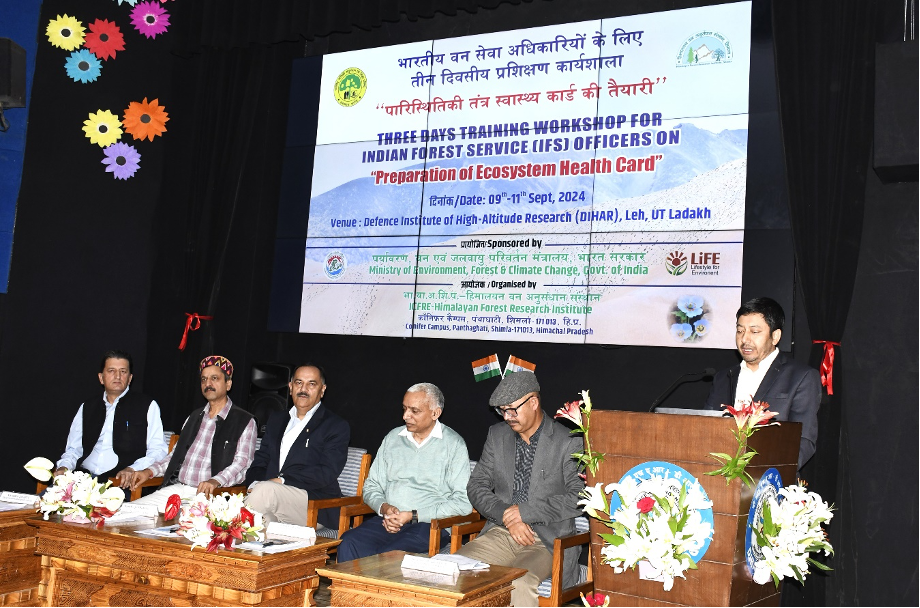
Leh (Ladakh): Importance of bio-diversity in forest management for ‘Preparation of Ecosystem Health Card’ was deliberated upon at a three day training workshop for officers of the Indian Forest Service that was conducted at Leh recently.
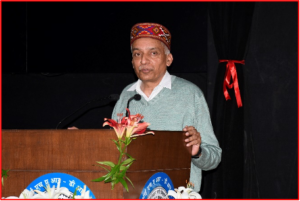
Where ecosystem health report cards are valuable tools for assessing and describing the ecosystem status, increasing public engagement and awareness, and also guiding policy-makers in management actions to contribute towards improvements of the ecosystem, Dr Sanjeeva Pandey, (former PCCF, HP) Senior Forest Consultant, USAID Forest PLUS 3.0 highlighted the importance of biodiversity in forest management.
“Conserving its bio-diversity was critical to maintaining healthy ecosystems in the trans-Himalayan region,” said Pandey.
Ms. Mahima Sharma of USAID-Forest PLUS 3.0 introduced the available the Forestry Tech-Tools, especially the Van App developed under the MoEF & CC-USAID collaborative Forest PLUS Project in support of Ecosystem Health Card.
Typically, report cards use indicators that are either with environmental focus or human focused (including social, economic, and cultural indicators). These groupings are flexible, and are based on the interests and values of the stakeholders involved.
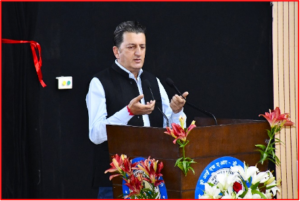
Dr Vaneet Jishtu, ICFRE-HFRI, Shimla who has conducted many research projects in plant-diversity through the trans-Himalayan cold desert region spoke about the threats that the Ladakh eco-system was facing from rising developmental works.
Dr Jishtu as the trainer coordinator of the workshop introduced the participants to the Trans Himalayan cold desert landscape of Ladakh and provided photographic impressions depicting its key features and characteristics of the landscape – habitation, culture, agriculture, and its unique biodiversity. He also emphasised the role of local communities in protecting and celebrating the floral elements.
Jigmet Takpa, former Chief Wildlife Warden of Ladakh in his talk about the ‘Potential and opportunities of developing eco-tourism in Ladakh’ flagged the success of Homestay scheme in protected areas (PAs), especially within the Hemis High Altitude National Park. He pointed out that there was an exponential rise in wildlife tourism across Ladakh where tourists were now visiting the area even during harsh winters and spending hefty amounts just to sight of the elusive snow leopard in the wild.
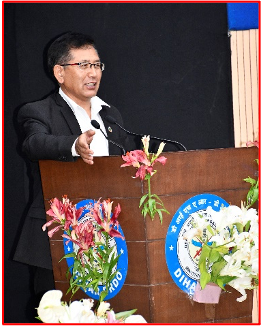
Dr Padma Gurmet, Director, National Institute of Sowa Rigpa (NISR), Leh detailed about the indigenous traditional knowledge systems of Ladakh by highlighting the ancient medicinal system of Sowa-Rigpa, popularly known as the Amchi or Tibetan system of medicine. He cautioned about the sustainable use of medicinal plants used in the Amchi system.
BM Sharma, Chief Wildlife Warden, Ladakh, highlighted role of the forest department in conserving biodiversity of the region, with special focus on the rare and endangered faunal species.

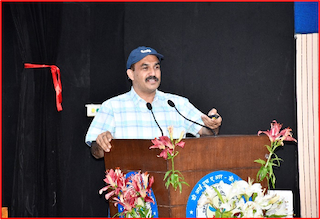
Dr Pankaj Chandan, a Nature Conservation Scientist at Himalayan Foundation for Conservation Leadership, Jammu linked the population sightings of “Black-necked Crane as an Indicator of Ecosystem Health in Ladakh”. After presenting an overview of high-altitude wetlands in India, China, and Bhutan, Dr. Chandan pointed out that successful breeding of the Black-necked Crane in any high-altitude wetland was a strong indicator of the health of the wetland. He said, “understanding of the Black-necked Crane as an indicator species underscores the importance of conserving high-altitude wetlands, not only for the cranes but for the broader biodiversity and ecosystem services they support.”
Dr Sandeep Sharma, Director, ICFRE-HFRI, Shimla said that the ecosystem health is a crucial concept for understanding the well-being of our planet as it weaves in the intricate relationships between living organisms and their physical environment, determining the sustainability of life on Earth.
The training workshop, conducted by the federal governments Ministry of Environment, Forest & Climate Change at Defence Institute of High-Altitude Research (DIHAR) Leh, was attended by 26 participants from 16 states.



